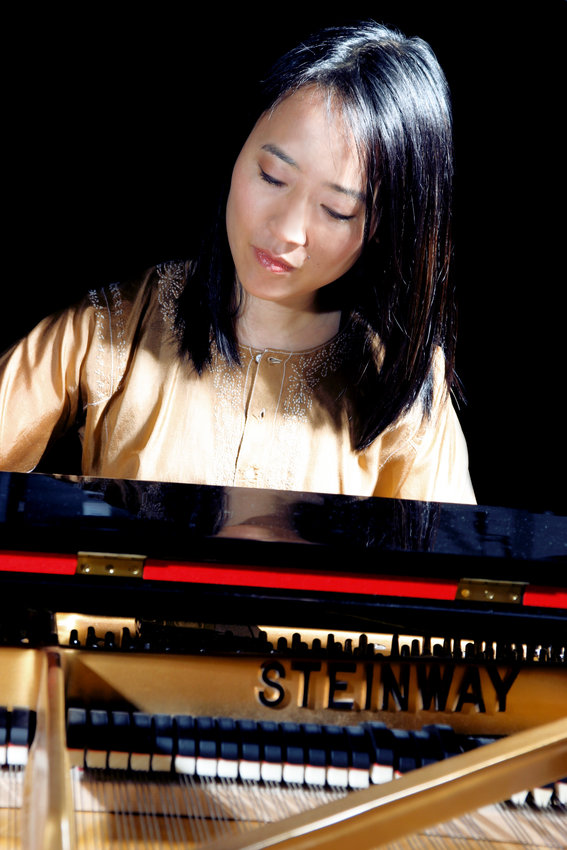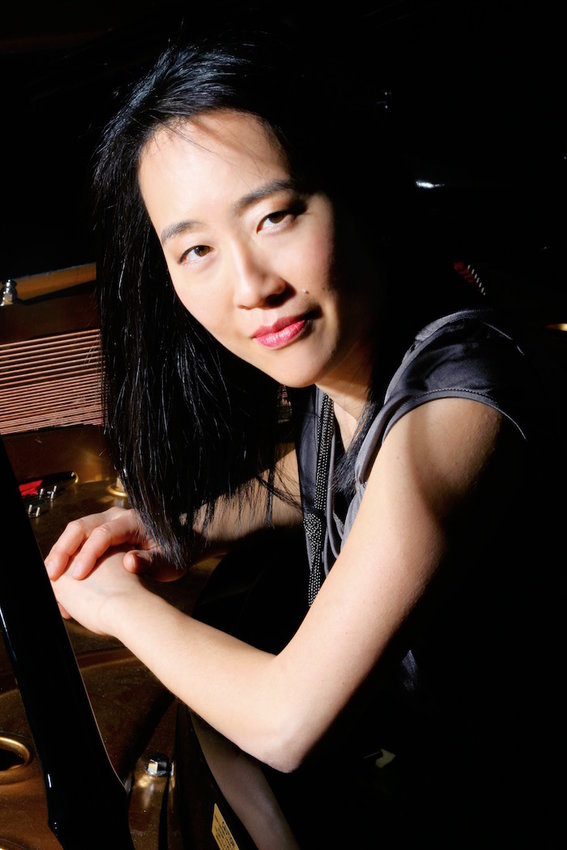Helen Sung started on a plastic piano with rainbow keys, at about four years old.
The keys turned to black and white for a long time until she broke from years of strict classical studies, threw herself into jazz and found the rainbow again.

She has a message for students with a classical background — if she can make a late-hour jump to jazz, they can.
“To really improvise forced me to face myself, to see if I had anything to say,” she said. “That’s a scary thing. It was the first time in my life I really took a risk of failure and I’m glad I did. The journey never stops.”
Sung is in East Lansing for the first extended residency of her career, teaching and barnstorming the state with MSU jazz students. The busy week will be capped by a joint concert at Demonstration Hall Friday.
Playing jazz made Sung deal with herself in ways classical music never did. She found that obedience was a cop-out.
“In classical music, I hid behind the notes,” Sung said.
Now she’s doing amazing things like touring India and Thailand with jazz legends Herbie Hancock and Wayne Shorter and taking New York and Tokyo by storm with the Mingus Big Band.
She spent much of 2017 with drummer T.S. Monk in a globe-spanning series of tributes to Monk’s father, Thelonious Monk. 2017 was Thelonious Monk’s centennial birthday year.

Sung, based in New York, is a big fan of bassist Rodney Whitaker, director of jazz studies at MSU. She’s seen a lot of MSU jazz grads take root in the Big Apple. Two bassists trained by Whitaker and the faculty at MSU, Endea Owens and Adam Olszewski, have done stints in Sung’s ensemble.
“It’ll be cool to see where it all starts,” Sung said.
Encouraged by traditional-minded parents, Sung homed in on classical studies as soon as she outgrew the plastic piano. At Houston’s fabled High School for Performing and Visual Arts, today’s jazz artists like Robert Glasper, Jason Moran, Eric Harland, Kendrick Scott were across the hall, but she was busy being a “practice room geek.”
“I don’t think I went to one jazz concert,” she said. “I wasn’t much of a rebel. I wish I had been more open.”
She soldiered through graduate studies at the University of Texas with an old-school Russian piano teacher, Sophia Gilmson, who required strict obedience.
“I wish I could go back now and listen to all that music with my own ears,” Sung said.
During a break in a concert at U of T by visiting bandleader Harry Connick, Jr., Connick played a couple of solo jazz tunes. Watching him improvise, Sung felt something go “ping” in her brain.
“He broke all the rules I was following,” she said.
While catching up on the jazz she’d missed all her life, she heard a recorded solo by Detroit-born jazz icon Tommy Flanagan (“Confirmation” by Charlie “Bird” Parker). Flanagan’s elegance, spontaneity and swing hooked her once and for all.
“There’s a mystery about swing, at its core,” she said. “It’s the unique thing that jazz offers to the world. Other music has improvisation and other things, but swing is unique to jazz.”
The informal moments of a weeklong residency are just as important to Sung as the lessons. She’ll bring some of her own arrangements and hold master classes, but the real fun comes when they go to high schools around the state (including Detroit, Hastings and Cheboygan), riding the bus and breaking bread together.
The tours make Sung think of her own time at the Thelonious Monk Institute of Jazz in Washington, D.C, working and hanging out with the form’s greatest artists.
“They’d take us out to dinner, tell us stories,” she said. “That community is just as great as them working with us.”
Talk will undoubtedly turn, as it does everywhere now, to the experience of women in an overwhelmingly male-dominated field.
Incredibly, one of Sung’s classical teachers told her she probably would not succeed in jazz because she is a woman and Asian.
“There is a camaraderie among men, and there’s nothing wrong with that,” Sung said.
But too often, Sung is the lone woman on the stage, in the studio or in a roomful of jazz musicians.
“Or there are two, which is also weird, because the women start to compete with each other,” she said. “If we could only get that percentage up.”
Sung said she used to rely on advice like “great music is beyond category” (from bassist Charlie Haden) or “what makes you different gives you strength” (from saxophonist Jimmy Heath).
“But now I’m grappling with all this,” she said. “I’m beginning to think maybe that’s a cop-out.”
She said men have been very supportive over the years, but she still has to worry about being alone with a bandleader in a hotel room.
“I’ve seen it all, the good, bad and ugly,” she said. “But now, with all that’s happening, although a lot of ugliness has been revealed, this is a great time to make a change and make the work environment a welcoming place.”
Support City Pulse - Donate Today!
Comments
No comments on this item Please log in to comment by clicking here